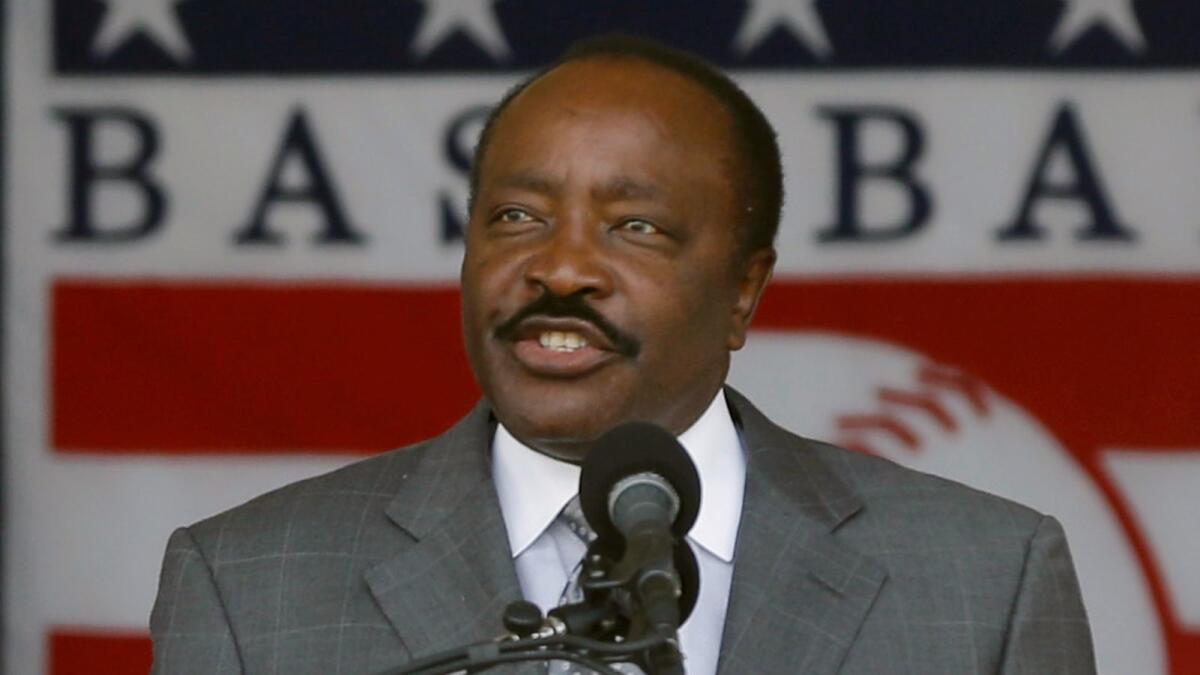Hall of Fame Vice Chairman Joe Morgan to Barry Bonds and Roger Clemens: We don’t want you

- Share via
The Hall of Fame suggested publicly Tuesday what it has long signaled privately: It does not want Barry Bonds and Roger Clemens to be elected.
There can be no other conclusion. After a half-decade of hearing the Hall of Fame maintain a diligent facade of professing to trust baseball writers to make their own judgments, voters awoke Tuesday to a letter emailed by the Hall of Fame, signed by the vice chairman of the Hall, with this message: “Steroid users don’t belong here.”
What Joe Morgan wrote in his letter is not a new sentiment for him. If he wanted to speak out, as is his right, the Hall of Fame should have gently advised him to do it on his own time. But perhaps the Morgan letter is better viewed as the latest and most honest step in the Hall’s apparent campaign to minimize the chances that Bonds and Clemens could be elected.
Bonds, the only seven-time most valuable player, and Clemens, the only seven-time Cy Young award winner, first appeared on the Hall of Fame ballot in the 2013 election.
Since then, the Hall has taken two actions perceived to lessen the chances of Bonds and Clemens. The Hall has shortened the window for election from 15 years to 10 and, with ballots increasingly crowded, it has declined the Baseball Writers Assn. of America request that voters be allowed to cast their ballot for a maximum of 12 candidates instead of 10.
On the other hand, the Hall gave Bonds and Clemens a huge if inadvertent assist: purging voters who had not covered baseball in at least 10 years, removing a bloc that tended to be less forgiving to players associated with the use of performance-enhancing drugs.
In their first three years on the ballot, Bonds and Clemens each received from 35% to 38% of the vote. In 2016, the first year of the new electorate, Clemens got 45% and Bonds 44%.
And in the 2017 election — after a Hall committee voted in Bud Selig, the commissioner who oversaw the steroid era — Bonds and Clemens each jumped to 54%.
There is no event likely to trigger a similar jump in the voting this year. But with 75% of the vote required for election, 54% must be getting uncomfortably close for Morgan and the “many of the Hall of Famers” for which he said he spoke.
“A day we all knew was coming has now arrived,” Morgan wrote in his letter. “Players who played during the steroid era have become eligible for entry into the Hall of Fame.”
That day came long ago. Bonds and Clemens have been eligible for five years. Mark McGwire’s 10 years on the ballot already have come and gone.
No, it is the day that might be coming that Morgan and his peers fear, the day they might have to listen to Bonds or Clemens deliver an induction speech.
“It’s gotten to the point,” Morgan wrote, “where Hall of Famers are saying that if steroid users get in, they’ll no longer come to Cooperstown for Induction Ceremonies or other events. Some feel they can’t share a stage with players who did steroids.”
That, of course, would be their right.
And it is the right of every voter to determine how to cast a ballot.
Is it just about statistics? Should players linked to steroids be disqualified? Just the ones who have failed a drug test? Been suspended under baseball’s drug policy? Fingered by George Mitchell, or by Jose Canseco?
Or should a steroid taint be one strike against a candidate, not all three strikes?
There is no one correct answer. The Hall of Fame pretended to trust the Baseball Writers’ Assn. of America and let each voter draw his or her own conclusion, until the Hall’s vice chairman warned Tuesday that only certain conclusions would be appreciated.
Follow Bill Shaikin on Twitter @BillShaikin
More to Read
Go beyond the scoreboard
Get the latest on L.A.'s teams in the daily Sports Report newsletter.
You may occasionally receive promotional content from the Los Angeles Times.











